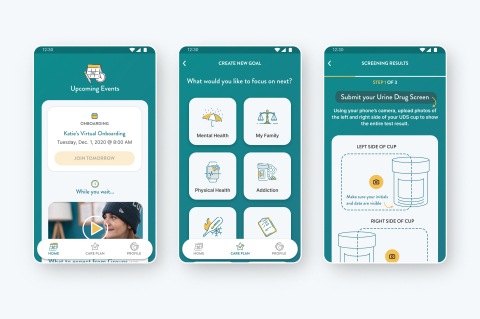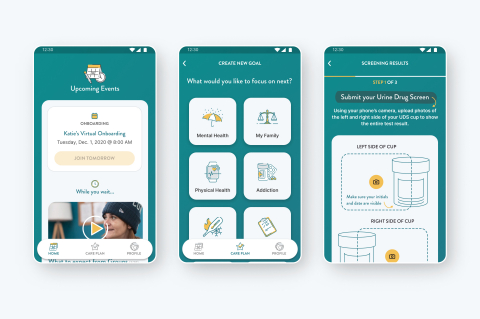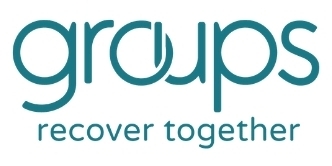BOSTON--(BUSINESS WIRE)--HLTH CONFERENCE-- Today at HLTH, Colleen Nicewicz, CEO of Groups Recover Together (Groups), the national leader in value-based care for opioid addiction treatment, announced the launch of a proprietary digital platform for their members. The platform, an app-centric experience that offers the full-suite of Groups’ services and is designed to simplify the member experience, boasts features around self-scheduling, outreach, contextualized content, treatment planning, group therapy, payment, forms and more.
The launch of the digital platform comes after nearly a year of careful planning, which included multiple focus groups and 4 months of pilot testing with 400 individuals who registered through the app directly. “It was important to us that our members be a significant input in the design of this platform,” said Michelle Cartier, VP of Product Management at Groups Recover Together. “That focus on letting our members guide the way has led us to be more thoughtful about how the app can build and foster community, as well as reduce friction in the overall recovery experience. Recovering from opioid addiction is hard enough. We knew we had to build a tool that enhanced and simplified the member experience.”
One member said of the Groups app, “You live in such a disorganized way through addiction that it’s refreshing to have some things a little simpler.”
The digital platform was inspired, in part, by the effectiveness that Groups has seen through telemedicine. Early in the pandemic, Groups made the decision to shift their entire member-base to virtual treatment. After six months of data collection, they found that core outcomes -- attendance, abstinence, and retention -- stayed the same even after the switch to 100% telemedicine. Furthermore, in an internal survey, 87% of Groups’ members said they felt as or more supported through telemedicine. And nearly 90% accessed their group therapy sessions via a smartphone. More of Groups’ outcomes data are set to be published in a peer-reviewed research study conducted in partnership with UCLA in the coming months.
“Clinically speaking, not only did the data show that our members did quite well with telemedicine, we could see that many of our members actually began to demand this flexibility over time,” said Dr. Jacob “Gus” Crothers MD, Chief Medical and Outcomes Officer at Groups. “The digital app is about meeting our members where they are. It’s about improving access to quality OUD care to all who need it -- regardless of who they are or where they live.”
In fact, today, 29% of Groups’ 9,000 members live in a county where there is no Groups clinic. Prior to the pandemic that number was near zero. As a result of this expanded reach through telemedicine, Groups’ membership has grown 66% since the start of the pandemic.
The Groups app is designed to use the digital space to its advantage. Rather than just moving in-person interactions online, the app capitalizes on and centralizes the benefits of technology. For instance, the app simplifies paperwork collection—insurance information, proper identification, and signed consent forms—a process that can be overwhelming and frustrating for members during intake. In addition, virtual onboarding introduces the member to an OpenTable-like self-scheduling feature that allows them to book an intake appointment with a clinician at a time that works for them.
Once onboarded, members using the app are able to engage in group counseling directly and utilize other features that promote a sense of community. The app is designed to guide the user through the recovery journey. It not only delivers content that educates members about what to expect from treatment, but also allows the user to create personalized and interactive treatment plans that reflect their short and long-term goals.
The platform is also designed to reduce administrative burden on staff. It seamlessly integrates with Groups’ EHR and clinicians use it for treatment planning, status visibility, and check-ins.
Longer term, Groups expects more robust and personalized functionality to be rolled out -- including more community building features, personalized content for people in various stages of their recovery, and designed interventions based on user behavior within the app.
Groups expects that most of their members will eventually be using the app to support their treatment, but that does not mean that Groups intends to end in-person services. Rather, Groups will continue to devote its resources to reaching members where they feel most comfortable, be that in-person, virtually, or a mix of both. Groups does anticipate that even those members who go back to in-person treatment will use the app to supplement their care experience.
“Recovery is a 24/7 commitment, work that extends outside the 1-hour per week treatment window that our members receive at Groups,” said Colleen Nicewicz, CEO of Groups Recover Together. “This app centralizes our highly effective care model onto one easy-to-use platform and allows our members to access the support of the Groups community, wherever and whenever they need to.”
To support this new technology-enabled model, Groups is also announcing the addition of industry veteran and experienced technology executive, Jim Harter, to its leadership team as Chief Technology Officer. Jim will be building out a development team to support the infrastructure that the digital platform is built on, as well as overseeing the development of new features and functionality.
About Groups Recover Together:
Groups Recover Together delivers opioid addiction treatment services that are proven to help individuals get their lives back on track. Groups provides fast, easy access to medication-assisted treatment (MAT), using Suboxone (buprenorphine), as well as a program designed to build a sense of community and accountability. In addition, members gain access to services through Groups' holistic care model, which is backed by the belief that long-term recovery from opioids is tied to social, behavioral and economic factors that aren't typically addressed in traditional treatment models. Learn more at joingroups.com or follow us on Facebook, LinkedIn and YouTube.




